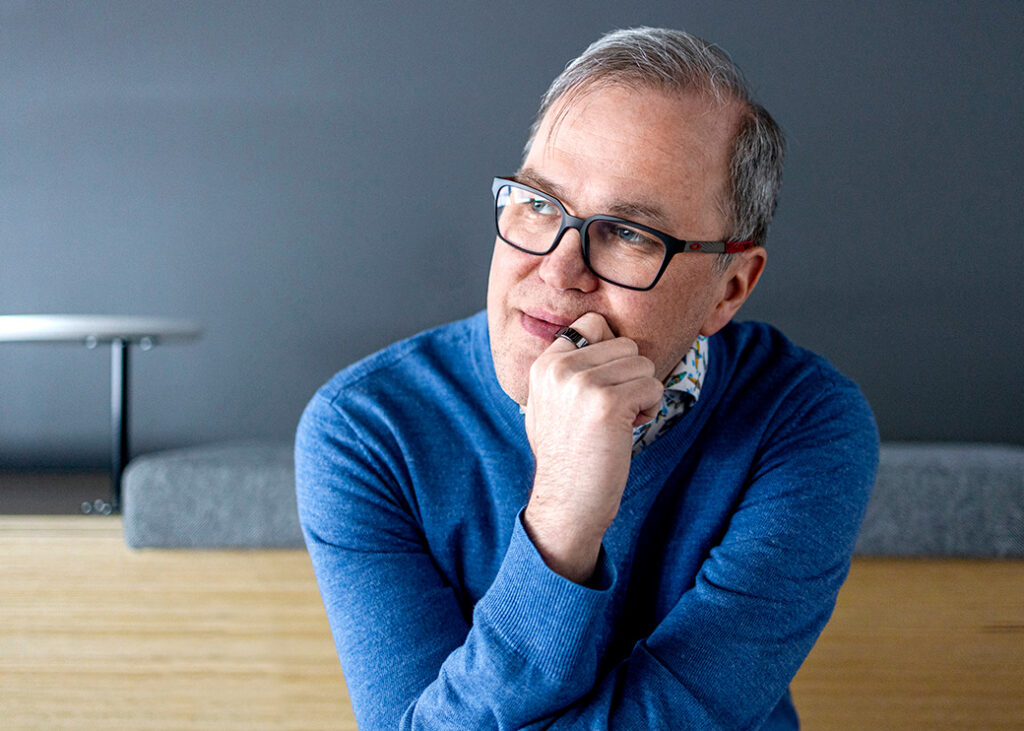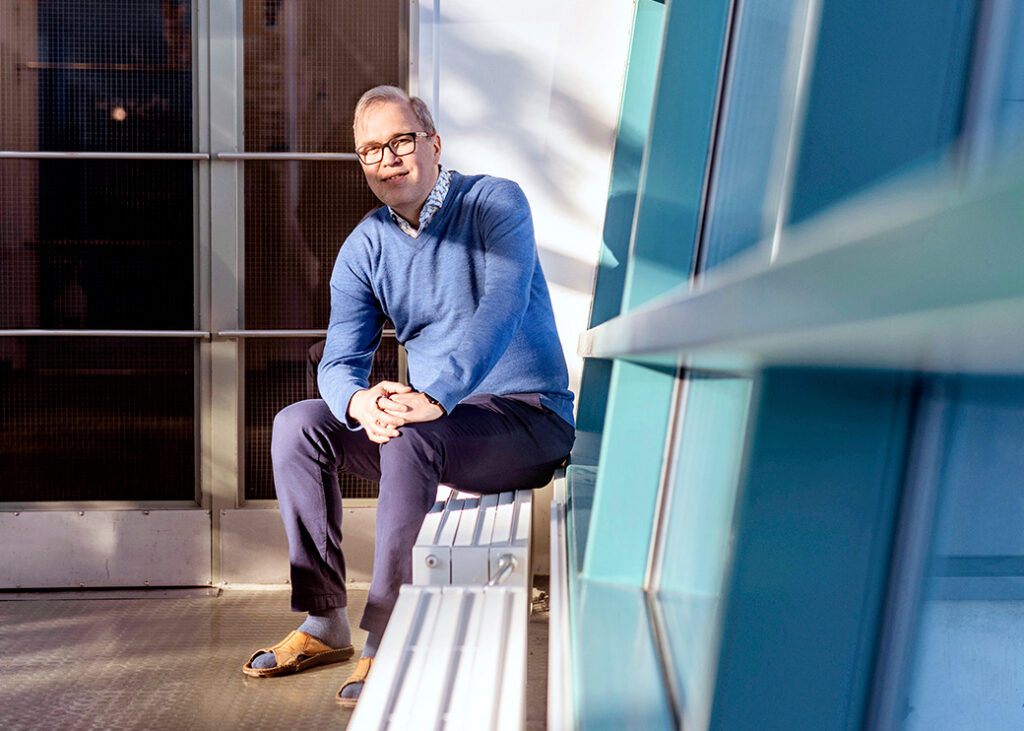For the new President of the Finnish Union of University Researchers and Teachers, Tero Karjalainen, boosting wellbeing and letting people get on with it and do science are high on the agenda. He encourages the universities to compete through good HR policies.
”I am not going to be a charismatic preacher giving sermons on stage”, said Tero Karjalainen upon being chosen as the new President of the Finnish Union of University Researchers and Teachers. His two-year term began at the start of this year Sermons may not be forthcoming, but advocacy for important matters definitely is.
Karjalainen summarises his most important goals in one word: “Wellbeing.” Focusing on scientific work and finding it meaningful are hurt by the lack of job security and the constant pressure to obtain funding. These issues have a direct effect on coping at work.
“One issue with the new funding model is its almost fully income-based nature. That is uncommon from an international point of view as well. Problems trickle down to individual workers.”
When talking about wellbeing, Karjalainen refers to all workers.
“We should be able to come up with solutions to support everyone’s core competence. How do you ensure that administrators, researchers and teachers can get on with their jobs?”

Karjalainen calls for sufficient availability of expert support services. The tensions between long- and short-term financial instruments are also reflected in wellbeing. Or the lack thereof. What also brings some peace and quiet is not creating new, separate structures in the event of change.
“We must recognise existing communities and integrate changes to the current structures. The biggest challenges involve succeeding amidst several simultaneous change trends. Actions related to open data and the green transition mean even more work gets piled up.”
FUURT members work in multiple sectors.
“As a union, we can offer our members a stronger professional identity and a community of academics. Not every workplace necessarily has a community with an academic professional identity.”
Diverse member perks such as advisory services for grant-funded workers and various training offerings provide career support.
We must recognise existing communities and integrate changes to the current structures.
“As a union and associations, we have plenty to do to ensure membership is meaningful even when our members move on from the university.”
The number of foreign members in the union has increased drastically.
“The old strategic goal to get more international academics in Finland is being accomplished.”
The situation is challenging for the union and academic jobs alike.
“As a union, we have chosen to work trilingually.”
That is not always possible.
“We are looking for meaningful strategies for ensuring all our members can fully participate in our activities.”
FUURT is also looking for ways to support Finnish and Swedish studies.
In search of an inviting campus
Karjalainen’s primary job is serving as the Director of the University of Eastern Finland’s Centre for Continuous Learning (JOK).
“I have seen my own people struggle with the workload too. New things are coming all the time. We should determine which old things we could get rid of.”
So, meaningful organisation of work is also on Karjalainen’s personal agenda. In terms of schedule, Karjalainen has planned a six-day work week, paced by three jobs. His work as the leader of JOK and UEF’s campus development project are his paid jobs whereas the FUURT presidency is a voluntary activity. The risk of becoming distracted is something he is aware of.
“People around me also recognises the fact I might overdo it”, he says and smiles, seeming relaxed.
When his focus is split between working on several different matters in different places, Karjalainen’s solution is to focus on the moment, i.e., fully concentrate on the task at hand. He has also given the people around him a clear instruction.
“If you see I’m not present, wake me up.”
Karjalainen’s job involves plenty of travel between the Kuopio and Joensuu campuses. During shared work commutes, which can be handled using the university’s electric car, he enjoys conversing with his colleagues.
UEF’s campus development project is in its early stages. Better meetings are being looked for. The goal is to create premises that genuinely makes university people want to go to the campus.
As a union, we have chosen to work trilingually.
Karjalainen has first-hand experience of how bringing two physically separated research groups into the same building created dialogue between researchers, resulting in common research projects. A strategically placed break room may lead to ground-breaking science.
Distribution of power needs reviewing
Karjalainen is used to making his voice heard in FUURT, having served two terms as Vice President in 2007–2008 and 2019–2022. Have the challenges in academia changed meaningfully in the last fifteen years?
“Some issues, such as the amount of fixed-term work the short-term nature of that work, are age-old questions.”
On the other hand, as the university has reshaped itself, advocacy talk has given way to broader university discourse.
Karjalainen refers to the old-style university with the term “accounting office university”. As HR policy has fallen into the universities’ hands, criticism towards the implementation has been plentiful.
New things are coming all the time. We should determine which old things we could get rid of.
“The change from the accounting office to the current situation has been enormous for the administrative workload alone. We must stay sensitive in terms of where we need reviews.”
Karjalainen points out that a set of norms is also needed.
“For example, should we have multi-body regulations? The faculty councils currently have no real power, so they don’t motivate people to participate.”
Karjalainen awaits a time when the universities compete through good HR policies. He also encourages them to take initiative and responsibility to ensure the long-term meaningfulness of scientific work.
“Where will we find the first university to boldly remove itself from the ministry model and produces results along the ministry’s lines whilst operating according to its own needs?”
Enabler available
When Karjalainen took up his position as the Director of the Centre for Continuous Learning, his first move was to arrange a personal meeting with each of his 70 subordinates. He also gave them all his own life story in pictures.
“I wanted to get to know those people, but also find out what talent they have that they have not yet been able to use. If you have additional desires, interests, and knowhow, you should not be afraid to bring it up. We were able to open up new jobs based on these meetings.”
Karjalainen considers it important for people to feel they can approach their superiors without unnecessary barriers. To illustrate, he provides an example. Whilst leaving their one-on-one meeting, one employee turned and said, “You won’t believe how scared I was to come to this meeting.”
Similar situations in that individual’s professional career had resulted in negative experiences, which influenced their feelings.
Another part of the early phase was reorganising the unit’s internal leadership.
Some issues, such as the amount of fixed-term work the short-term nature of that work, are age-old questions.
“I said to myself that I couldn’t be a manager for 70 people.”
Now the Centre for Continuous Learning is split into five teams, each with their own manager. The development of internal operations is ongoing.
“For example, group determination needs more development.”
According to Karjalainen, he identifies in himself the desire to promote common matters and make a difference. Even back in his school days, he was involved with student council work. He became part of the FUURT Kuopio association while at the Department of Medical Physics. He has also cultivated his management philosophy practices in his 14 years as a junior football coach. As a leader, he describes himself as an enabler first and foremost. Giving someone the opportunity to shine and develop is done by opening their eyes.
“It’s essential to know to ask the right questions, not give answers. You don’t lead people through the right to direct. If you point at that, you’ve already lost.”
The enabler tells us he also refers to himself as a matchmaker. The master of successful meetings says he is now facing a new challenge.
”I can’t spend two years just getting to know people.”
The laboratory of the fake physicist
Karjalainen, who has a PhD in Medical Physics, describes himself as a “fake physicist”. He also says he frequently recognises impostor syndrome in himself.
“I’m not much of a scientist. I’m more naturally inclined towards managing people. If I was a young Tero now, I’d probably go study sociology and social psychology.”
The steps of his career progression and his personal interests can be retraced to the period after gymnasium, when he applied for both medical and technical studies. He spent his first year of studies on LUT’s roster. Military service and Reserve Officer School were followed by a year of open university studies of pedagogy and psychology.
The academic lamp was well and truly lit when Karjalainen was attending a hospital physicist’s lecture at the University of Kuopio.
“Hospital physics combine human anatomy, technology, and diagnostics.”

Impostor syndrome or no, Karjalainen has gained renown at his alma mater as a hospital physics pioneer by introducing ultrasound surgery to Finland. He completed his master’s thesis in the radiation department. A hospital physicist’s career awaited, but then came a call from Karjalainen’s department. He was summoned to Boston, and so the new researcher flew there with his wife, who was pregnant with their first child. Starting his PhD in the US was tied to speeding up the Kuopio department’s operations. Karjalainen sent a list of all the equipment needed to set up a lab from Harvard to Kuopio.
Glass ceiling shatter
What also speaks volumes about the results of Karjalainen’s own inclinations and the expertise he has accrued is the fact he has managed to break through the glass ceiling twice in his career. Usually, the head of a department is someone with a finished PhD, but Karjalainen’s one-year stint in charge of the Department of Technical Physics became reality before he was officially a doctor.
The glass ceiling shattered a second time when he was chosen as Professor of the Year by UEF students – despite Karjalainen not actually being a professor.
One of the most memorable bits of feedback came at a family gathering. “My cousin’s spouse told me that even though you’re in academia, you’re still a good guy. I took that on board as positive feedback.”